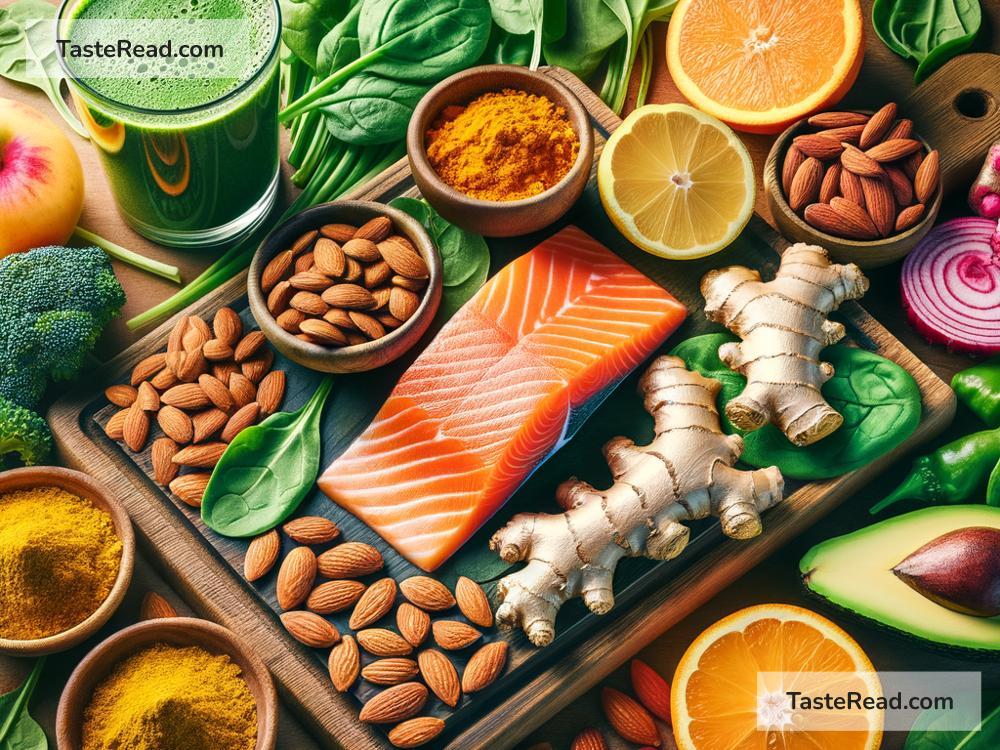Foods That Reduce the Risk of Tendonitis
Tendonitis, also known as tendinitis, happens when your tendons—tissues that connect muscles to bones—become inflamed or irritated. It can cause pain, stiffness, and swelling, making everyday tasks more difficult. While overuse or injury are common causes, diet plays an important role in preventing inflammation and keeping your tendons healthy.
In this article, we’ll explore simple and nutritious foods that can reduce the risk of tendonitis. By adding these to your diet, you can promote healing, protect your tendons, and enjoy better overall health.
The Role of Diet in Tendon Health
Inflammation is at the root of tendonitis. Foods that are high in sugar, processed ingredients, and unhealthy fats can worsen inflammation and slow down recovery. On the other hand, eating foods rich in anti-inflammatory compounds can help protect your body from tendonitis and promote healing when inflammation occurs.
Your body also needs enough nutrients—like vitamins, minerals, and protein—to repair tendons and keep them strong. A balanced diet that prioritizes whole, fresh ingredients can make all the difference.
Top Foods That Help Prevent Tendonitis
Here are some of the best foods to include in your diet to reduce the risk of tendonitis:
1. Fatty Fish
Fatty fish like salmon, mackerel, and sardines are loaded with omega-3 fatty acids, which are powerful anti-inflammatory nutrients. Omega-3s help reduce swelling and pain caused by inflammation while promoting overall joint and tendon health. If you don’t eat fish, you can try plant-based sources of omega-3s like flaxseeds, chia seeds, and walnuts.
2. Leafy Green Vegetables
Spinach, kale, and other leafy greens are packed with antioxidants and vitamins, including vitamin C and beta-carotene. These nutrients help fight free radicals in your body that can contribute to inflammation. Greens are also high in magnesium, which supports muscle and tendon recovery.
3. Berries
Did you know that blueberries, strawberries, and raspberries are not only delicious but also great for reducing tendonitis risk? Berries are rich in antioxidants called anthocyanins that combat inflammation and oxidative stress. Snack on berries or add them to smoothies for a tendon-friendly treat.
4. Turmeric
Turmeric is a golden spice widely known for its anti-inflammatory properties. It contains curcumin, an active compound that reduces inflammation and supports tissue repair. Add turmeric to soups, stews, or tea to help keep tendonitis at bay.
5. Nuts and Seeds
Almonds, walnuts, pumpkin seeds, and sunflower seeds are rich in healthy fats, vitamins, and minerals. They’re a great source of vitamin E, which helps prevent damage caused by inflammation. Enjoy a handful of nuts and seeds as a snack or sprinkle them on salads.
6. Whole Grains
Swap refined grains like white bread and pasta for whole grains like quinoa, brown rice, oatmeal, and whole-wheat bread. Whole grains are high in fiber and have a lower glycemic index, meaning they cause less inflammation compared to processed grains.
7. Citrus Fruits
Oranges, lemons, grapefruits, and other citrus fruits are packed with vitamin C, which is essential for tendon health. Vitamin C plays a key role in collagen production, a protein that strengthens tendons and allows them to heal properly.
8. Olive Oil
Extra virgin olive oil is a heart-healthy fat that also has anti-inflammatory properties. It contains compounds like oleocanthal that work similarly to pain-relief medications. Use olive oil as a dressing for salads or in cooking to support tendon health.
9. Garlic
Garlic not only adds flavor to meals but also helps reduce inflammation. It contains organosulfur compounds that soothe swelling and support healing. For maximum benefits, crush fresh garlic before using it in your recipes.
10. Bone Broth
Bone broth is a nutrient-packed liquid made by simmering animal bones with water and vegetables. It’s full of collagen, amino acids, and minerals that help repair and strengthen tendons. Sip on bone broth or use it as a base for soups.
Foods to Avoid
While eating anti-inflammatory foods is crucial, avoiding inflammation-triggering foods is just as important. Limit your intake of:
- Sugary Foods and Drinks: Soda, candy, and desserts can increase inflammation.
- Fried and Processed Foods: Chips, fast food, and pre-packaged snacks are loaded with unhealthy fats.
- Refined Carbs: White bread, white rice, and pastries can spike blood sugar levels and worsen inflammation.
Other Tips for Reducing Tendonitis Risk
Along with eating tendon-friendly foods, there are other ways to lower your risk of tendonitis:
- Stay Hydrated: Drinking plenty of water helps keep tendons flexible and prevents stiffness.
- Exercise Wisely: Avoid overusing muscles and take breaks during physical activity.
- Stretch Regularly: Stretching improves flexibility and reduces the risk of injury.
- Maintain a Healthy Weight: Extra weight puts strain on your tendons, so maintaining a balanced weight can help.
- Get Enough Sleep: Sleep is when your body repairs itself, including your tendons.
Conclusion
Tendonitis can be painful and disruptive, but you can lower your chances of developing it by eating anti-inflammatory foods that keep your tendons healthy and strong. Include fatty fish, leafy greens, berries, turmeric, and other nourishing foods in your diet, and avoid processed and sugary foods that worsen inflammation.
Making smarter food choices not only helps protect your tendons but also promotes better overall health. Combined with proper hydration, exercise, and good sleep habits, your diet can be a powerful tool for preventing tendonitis and staying active.


